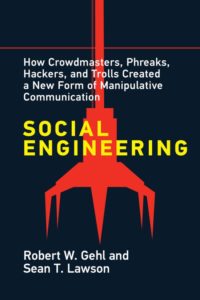NEWS
Gehl authors new book on social engineering
Dr. Robert Gehl, F. Jay Taylor Endowed Research Chair of Communication, recently published his latest book, Social Engineering: How Crowdmasters, Phreaks, Hackers, and Trolls Created a New Form of Manipulative Communication.

The book examines manipulative communication from early 20th Century propaganda to today’s online con artistry through the lens of social engineering.
“This book draws on concepts developed by computer hackers to help us understand the disinformation proliferating across the internet,” Gehl said. “It also sheds new light on the history of public relations and propaganda.”
Gehl co-authored the book with Sean Lawson, Associate Professor of Communication at the University of Utah. Gehl said that the topics discussed in their book correlate to the actions that are taking place in Russia during its current conflict with Ukraine.
“We argue that the current disinformation environment is a mix of interpersonal con artistry and societal-scale manipulative communication practices,” Gehl said. “Frankly, we’re seeing this in action right now inthe case of Russia’s disinformation campaign related to the Ukraine invasion.”
Through their research, Gehl and Lawson show that online misinformation has its roots in earlier techniques: mass social engineering of the early 20th Century and interpersonal hacker social engineering of the 1970s, converging today into what they call “mass-personal social engineering.”

The authors showhow specific manipulative communication practices are a mixture of information gathering, deception, and truth-indifferent statements, all with the instrumental goal of getting people to take actions the social engineer wants them to.
To learn more about Social Engineering: How Crowdmasters, Phreaks, Hackers, and Trolls Created a New Form of Manipulative Communication, visit the MIT Press website.
Recent Comments